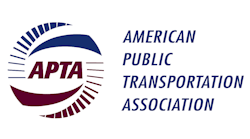Introduced Bill Fails To Address Key Priorities of the Public Transit Industry Reaction to H.R. 1, the “Tax Cuts and Jobs Act”
The following is a statement from Richard A. White, acting president and CEO of the American Public Transportation Association:
The American Public Transportation Association and its more than 1,500 members have significant concerns with H.R. 1, the “Tax Cuts and Jobs Act.” While we are grateful for the commitment to maintain the tax-exempt status of municipal bonds, which is a vital financing tool for state and local government-sponsored public works projects, H.R. 1 fails to address key priorities of the public transportation industry.
With more than 250 House Members already supporting action on fixing the Highway Trust Fund (HTF), the opportunity to address the long-term solvency of the HTF as part of a comprehensive tax reform is a glaring omission. This is a missed opportunity to do something meaningful and immediate to address our long-term transportation infrastructure challenges. A predictable, long-term federal commitment to surface transportation investment is essential to the nation’s economic growth and international competitiveness. With funding for the HTF running out in 2020, now is the time to move forward. This tax bill represents the best and most realistic opportunity to accomplish this goal.
Current law treats the cost of commuting to work on public transportation as a tax-free fringe benefit that can be provided by an employer or utilized as a pretax payroll deduction. This is a valuable benefit that provides savings to millions of American workers and their employers. In many regions of the country, transportation costs are the second highest household expense.
We appreciate that this legislation clearly recognizes the value of the commuter tax benefit by retaining certain key elements, such as the pretax payroll deduction option. However, removing the option for employers to deduct the cost of those benefits, could be a disincentive for employers to offer this critical benefit that helps defray costs for working families.
Additionally, we request that Congress renew and permanently extend the federal tax credits for alternative fuels and related infrastructure that expired on December 31, 2016. A permanent extension would support the long-term energy security of our nation and provide certainty for the small, medium, and large-sized public transit agencies that serve our nation’s communities. Failure to renew these credits will discourage future investment in compressed natural gas or liquefied natural gas fleets. APTA also supports the inclusion of electric and hybrid electric vehicles within the eligible uses of this tax credit.
Finally, APTA is also disappointed that H.R. 1 would repeal the use of Private Activity Bonds (PABs), which are an important infrastructure financing mechanism. This provision is particularly surprising as Congress and the Administration develop a new infrastructure initiative focused on attracting private-sector investment and encouraging public-private partnerships. Preemptively removing PABs as a financing tool for infrastructure projects would undermine Congress’ stated goal of leveraging a $1 trillion investment in our nation’s infrastructure. Instead, this provision would have a chilling effect on private sector investments in infrastructure projects.
I urge Congress to use this once-in-a-generation opportunity to reform the tax code to encourage greater investment in our nation’s infrastructure, not discourage it. As introduced, H.R. 1 does not address this fundamental and critical issue for the public transit industry or the country. APTA and its members look forward to working with Congress as the legislative process continues.



